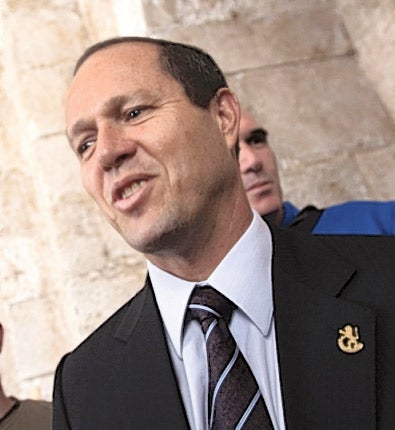Jerusalem's mayor denies building has been halted

Your support helps us to tell the story
From reproductive rights to climate change to Big Tech, The Independent is on the ground when the story is developing. Whether it's investigating the financials of Elon Musk's pro-Trump PAC or producing our latest documentary, 'The A Word', which shines a light on the American women fighting for reproductive rights, we know how important it is to parse out the facts from the messaging.
At such a critical moment in US history, we need reporters on the ground. Your donation allows us to keep sending journalists to speak to both sides of the story.
The Independent is trusted by Americans across the entire political spectrum. And unlike many other quality news outlets, we choose not to lock Americans out of our reporting and analysis with paywalls. We believe quality journalism should be available to everyone, paid for by those who can afford it.
Your support makes all the difference.Jerusalem's firebrand mayor has vowed to speed up Jewish construction in Arab-dominated East Jerusalem in comments that could undermine hopes of a long-awaited breakthrough in the peace process.
Speaking at an event in Washington, Mayor Nir Barkat took aim at the US administration, which has engaged in an intense round of diplomacy to persuade the Israelis to agree to a construction freeze to try to coax the Palestinians into peace talks, stalled now for more than a year.
Mr Barkat vigorously denied reports that the Israeli Prime Minister, Benjamin Netanyahu, has quietly instructed officials to halt construction in East Jerusalem while publicly announcing the opposite.
"The answer is no, a clear no," said Mr Barkat when asked if Israel would cease building in East Jerusalem until new talks are launched. "There is no freeze. It's not true."
Mr Barkat, a millionaire, was elected as a man who would defend secular interests and modernise the ancient city. Since taking up his post, critics have accused him of inflaming tensions within Jerusalem. He has flouted a court order demanding the eviction of Jewish residents from an illegal housing project in the heart of an Arab neighbourhood, and has proposed razing Palestinian homes to make way for city beautification projects.
His comments come at a sensitive time. The Palestinians were on the verge of returning to talks last month when Israeli officials revealed plans to build 1,600 new Jewish homes in East Jerusalem during the US Vice-President Joe Biden's visit. The untimely announcement earned Israel a sharp rebuke from Washington and plunged relations with the US, Israel's staunchest ally, to their lowest point in years.
The Palestinian leader, Mahmoud Abbas, said he would seek approval to start talks from the Arab League over the weekend, while Mr Netanyahu will meet the Egyptian President, Hosni Mubarak, early next week in Cairo to discuss negotiations.
Palestinians want East Jerusalem, captured and annexed by Israel after the 1967 six-day war, as the future capital of a Palestinian state, and fear Israel is seeking to make them a minority.
In a tense meeting at the White House last month, President Barack Obama instructed Mr Netanyahu to make confidence-building measures towards the Palestinian leadership. Although publicly defiant to appease his right-wing coalition, Mr Netanyahu reportedly assured Washington that there would be no "significant" actions in East Jerusalem.
Mr Barkat admitted that building approvals had slowed after the US "slapped [it] in the face", but insisted that he had no intention of stopping construction in a "vibrant and living" city such as Jerusalem.
"It takes some time to recover from such an attack from a friend like the US administration," Mr Barkat said, adding that housing commissions had started to meet again. Mr Barkat also rejected the principle of a Palestinian-controlled East Jerusalem, coveted by the Palestinians as their future capital. Ceding control, the mayor said, would be tantamount to putting an Arab "Trojan horse" into the heart of a predominantly Jewish community.
Ghassan Khatib, a spokesman for the Palestinian Authority, said: "We have learnt not to give much weight to what the Israelis say, but to what they do."
*Israeli soldiers killed a Palestinian who approached the Gaza Strip border to demonstrate against a no-go buffer zone imposed by Israel.
Join our commenting forum
Join thought-provoking conversations, follow other Independent readers and see their replies
Comments